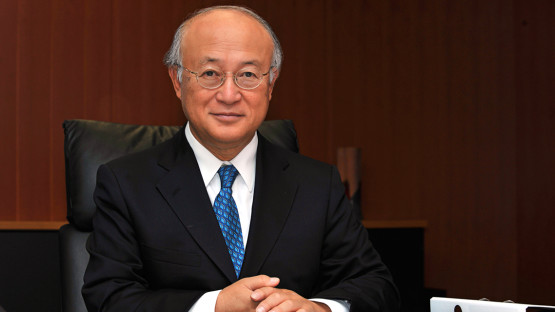Vienna, Austria | World Cancer Day 2012
Good afternoon, Ladies and Gentlemen.
Welcome to this IAEA event marking World Cancer Day 2012.
The Agency's work in cancer control has been a high priority for me since I became Director General just over two years go. When I travel to developing countries, I try wherever possible to see IAEA cancer control projects in action. This is always very uplifting.
In June and July last year, I visited a number of Latin American countries to discuss IAEA support for their cancer control efforts. In July, I went to the Mother Teresa Hospital in Tirana, Albania, where IAEA support has helped to significantly improve radiotherapy services and provided training for 23 health professionals to launch a breast cancer screening programme. In October, I had the opportunity to celebrate the opening of a new cancer therapy facility in Indonesia.
Also in October, I travelled to Vietnam. I visited the Tran Hung Dao hospital in Hanoi and saw some of the most high-tech cancer treatment equipment in use there. The IAEA had facilitated the donation of a radiotherapy unit from India to Vietnam in May 2010. It was very impressive to witness how quickly a country's cancer control capabilities can be transformed.
There are many such success stories throughout the world. But, of course, the need is great and there is still much work to be done.
For example, there is a shortage of around 5 000 radiotherapy machines in low and middle income countries. This means that hundreds of thousands of patients are denied diagnosis and treatment that could save their lives. The IAEA Programme of Action for Cancer Therapy - PACT - has been working hard to try to make radiotherapy services available in all countries.
The IAEA technical cooperation programme remains a major mechanism for providing assistance to Member States. The Agency is supporting over 130 projects in cancer diagnosis, management and treatment. Oncology and radiotherapy centres are being established in countries such as Afghanistan, Eritrea and Mozambique, while national capacity in radiotherapy is being strengthened in - for example - Albania and Kenya. Several regional projects are focusing on improving quality in radiotherapy services.
Our Division of Human Health provides resources for health professionals throughout the world through a special website known as the Human Health Campus. It contains up-to-date material and interactive learning tools in radiotherapy, nuclear medicine, medical physics and nutrition.
Ladies and Gentlemen,
World Cancer Day has a special meaning this year following the adoption by the United Nations General Assembly last September of the Political Declaration on Non-Communicable Diseases. The IAEA looks forward to participating in the Action Plan of the Global Strategy for the Prevention and Control of Non-Communicable Diseases 2013-2018, led by the World Health Organization.
The slogan of World Cancer Day this year is Together It Is Possible. This reflects the importance of international collaboration in the fight against the global cancer epidemic which, tragically, continues to claim the lives of over 10 million people per year. Seventy percent of those deaths are in developing countries.
I am grateful for the continued support for our cancer programme from donors and partners, some of whom are with us today. The Agency's PACT programme received over one million dollars in extra-budgetary funds last year.
I am especially pleased that Mr. Suleiman J Al-Herbish, Director General of the OPEC Fund for International Development (OFID), is with us today. OFID has supported very successful cancer projects in Ghana, Zambia, Uruguay, Albania, Nicaragua and Tanzania. In the last three years alone, contributions from OFID have exceeded 800 000 US dollars, while loans from OFID for cancer projects in Member States, facilitated through the Agency, have exceeded 15 million dollars. A few minutes ago, Mr Al-Herbish and I signed an agreement under which OFID will give 450 000 dollars to PACT to support projects to advance cancer control in Vietnam, with particular emphasis on women's cancers. Thank you very much, Mr. Al-Herbish.
We also have the privilege to have with us Dr. Julie Torode, Deputy CEO of the Union for International Cancer Control - UICC - the largest NGO against cancer, which initiated World Cancer Day. UICC is a key PACT partner in the field and a driving force behind cancer advocacy.
I am grateful to them and to all our other partners. I know that, together, we will continue to make a difference to the lives of many thousands of cancer patients and their families in the years to come.
Thank you.


